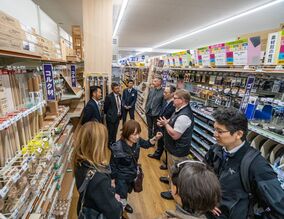
Fifteen representatives from private industry, lumber associations, state trade promotion offices, and academia joined the annual SEC-JLIA exchange in December. Now in its thirty first year, the meeting included one of the largest and most diverse groups to attend in several years. Experts on softwood lumber grading, engineered wood products, and softwood pellets fielded questions from JLIA members and provided in-depth information that contributed to the discussions.
The JLIA meeting has been instrumental in helping US exporters establish and maintain relationships with large Japanese importers and pre-cutters. The meeting and reception also provides a platform for SEC and JLIA members to discuss market trends and issues of concern.
Unspoken JLIA issues included declining European softwood log and lumber prices and declining Canadian lumber supply. According to the Japan Lumber Report, JLIA members had an uncharacteristically direct conversation with a delegation of Canadian lumber suppliers a month earlier about high prices and limited supply from Canada.
The US delegation also met with FAS-Tokyo staff to discuss issues affecting US softwood lumber sales to Japan and to communicate the importance of Japan toSEC and its members. During the briefing the US delegation asked FAS and the US Trade Representative’s office to speak on behalf of the US softwood wood products industry during the spring 2020 US-Japan Trade Agreement negotiations.
Under the agreement, tariffs on US forest products include a 4.8% Japan tariff on SYP and Ponderosa Pine lumber and a 3.9% tariff on glued-laminated materials, laminated veneer lumber, and cross laminated timber. FAS staff said that they would help where they could but that they also recommend that SEC inform USTR directly through the ITAC.
Day two of the program included a tour of two Ken Depot stores and a meeting with Yuichi Shinohara of Shinohara Corp., owner of one of the Ken Depot stores. Ken Depot is a nationwide chain of 70 member-only building materials stores for construction professionals.
Shinohara is a large pre-cutter and importer of US Douglas fir. The company purchased a store to develop lumber supplier relationships with other franchise owners.
The JLIA meeting has been instrumental in helping US exporters establish and maintain relationships with large Japanese importers and pre-cutters. The meeting and reception also provides a platform for SEC and JLIA members to discuss market trends and issues of concern.
Unspoken JLIA issues included declining European softwood log and lumber prices and declining Canadian lumber supply. According to the Japan Lumber Report, JLIA members had an uncharacteristically direct conversation with a delegation of Canadian lumber suppliers a month earlier about high prices and limited supply from Canada.
The US delegation also met with FAS-Tokyo staff to discuss issues affecting US softwood lumber sales to Japan and to communicate the importance of Japan toSEC and its members. During the briefing the US delegation asked FAS and the US Trade Representative’s office to speak on behalf of the US softwood wood products industry during the spring 2020 US-Japan Trade Agreement negotiations.
Under the agreement, tariffs on US forest products include a 4.8% Japan tariff on SYP and Ponderosa Pine lumber and a 3.9% tariff on glued-laminated materials, laminated veneer lumber, and cross laminated timber. FAS staff said that they would help where they could but that they also recommend that SEC inform USTR directly through the ITAC.
Day two of the program included a tour of two Ken Depot stores and a meeting with Yuichi Shinohara of Shinohara Corp., owner of one of the Ken Depot stores. Ken Depot is a nationwide chain of 70 member-only building materials stores for construction professionals.
Shinohara is a large pre-cutter and importer of US Douglas fir. The company purchased a store to develop lumber supplier relationships with other franchise owners.
